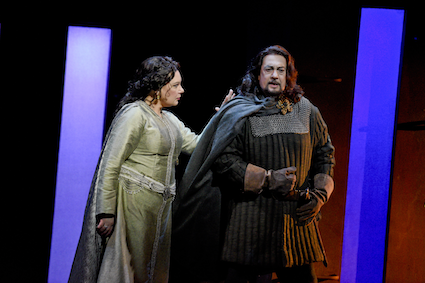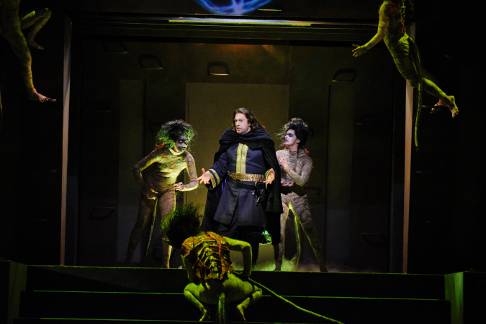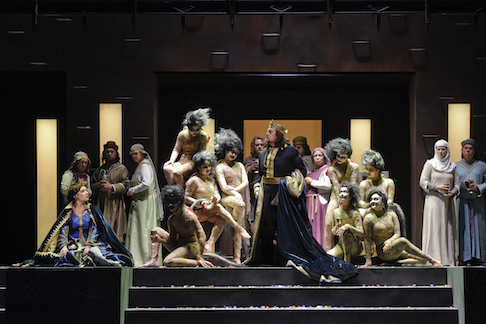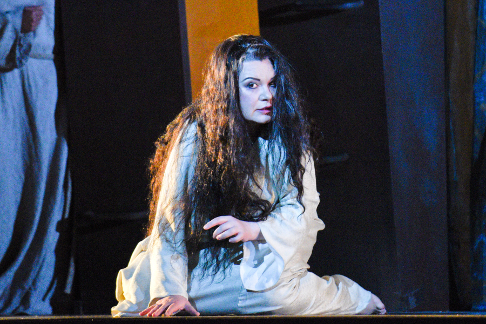Recently in Performances
English Touring Opera are delighted to announce a season of lyric monodramas to tour nationally from October to December. The season features music for solo singer and piano by Argento, Britten, Tippett and Shostakovich with a bold and inventive approach to making opera during social distancing.
This tenth of ten Live from London concerts was in fact a recorded live performance from California. It was no less enjoyable for that, and it was also uplifting to learn that this wasn’t in fact the ‘last’ LfL event that we will be able to enjoy, courtesy of VOCES8 and their fellow vocal ensembles (more below …).
Ever since Wigmore Hall announced their superb series of autumn concerts, all streamed live and available free of charge, I’d been looking forward to this song recital by Ian Bostridge and Imogen Cooper.
Although Stile Antico’s programme article for their Live from London recital introduced their selection from the many treasures of the English Renaissance in the context of the theological debates and upheavals of the Tudor and Elizabethan years, their performance was more evocative of private chamber music than of public liturgy.
Evidently, face masks don’t stifle appreciative “Bravo!”s. And, reducing audience numbers doesn’t lower the volume of such acclamations. For, the audience at Wigmore Hall gave soprano Elizabeth Llewellyn and pianist Simon Lepper a greatly deserved warm reception and hearty response following this lunchtime recital of late-Romantic song.
For this week’s Live from London vocal recital we moved from the home of VOCES8, St Anne and St Agnes in the City of London, to Kings Place, where The Sixteen - who have been associate artists at the venue for some time - presented a programme of music and words bound together by the theme of ‘reflection’.
'Such is your divine Disposation that both you excellently understand, and royally entertaine the Exercise of Musicke.’
‘And there was war in heaven: Michael and his angels fought against the dragon; and the dragon fought and his angels, And prevailed not; neither was their place found any more in heaven … that old serpent … Satan, which deceiveth the whole world: he was cast out into the earth, and his angels were cast out with him.’
There was never any doubt that the fifth of the twelve Met Stars Live in Concert broadcasts was going to be a palpably intense and vivid event, as well as a musically stunning and theatrically enervating experience.
‘Love’ was the theme for this Live from London performance by Apollo5. Given the complexity and diversity of that human emotion, and Apollo5’s reputation for versatility and diverse repertoire, ranging from Renaissance choral music to jazz, from contemporary classical works to popular song, it was no surprise that their programme spanned 500 years and several musical styles.
The Academy of St Martin in the Fields have titled their autumn series of eight concerts - which are taking place at 5pm and 7.30pm on two Saturdays each month at their home venue in Trafalgar Square, and being filmed for streaming the following Thursday - ‘re:connect’.
The London Symphony Orchestra opened their Autumn 2020 season with a homage to Oliver Knussen, who died at the age of 66 in July 2018. The programme traced a national musical lineage through the twentieth century, from Britten to Knussen, on to Mark-Anthony Turnage, and entwining the LSO and Rattle too.
With the Live from London digital vocal festival entering the second half of the series, the festival’s host, VOCES8, returned to their home at St Annes and St Agnes in the City of London to present a sequence of ‘Choral Dances’ - vocal music inspired by dance, embracing diverse genres from the Renaissance madrigal to swing jazz.
Just a few unison string wriggles from the opening of Mozart’s overture to Le nozze di Figaro are enough to make any opera-lover perch on the edge of their seat, in excited anticipation of the drama in music to come, so there could be no other curtain-raiser for this Gala Concert at the Royal Opera House, the latest instalment from ‘their House’ to ‘our houses’.
"Before the ending of the day, creator of all things, we pray that, with your accustomed mercy, you may watch over us."
The doors at The Metropolitan Opera will not open to live audiences until 2021 at the earliest, and the likelihood of normal operatic life resuming in cities around the world looks but a distant dream at present. But, while we may not be invited from our homes into the opera house for some time yet, with its free daily screenings of past productions and its pay-per-view Met Stars Live in Concert series, the Met continues to bring opera into our homes.
Music-making at this year’s Grange Festival Opera may have fallen silent in June and July, but the country house and extensive grounds of The Grange provided an ideal setting for a weekend of twelve specially conceived ‘promenade’ performances encompassing music and dance.
There’s a “slide of harmony” and “all the bones leave your body at that moment and you collapse to the floor, it’s so extraordinary.”
“Music for a while, shall all your cares beguile.”
The hum of bees rising from myriad scented blooms; gentle strains of birdsong; the cheerful chatter of picnickers beside a still lake; decorous thwacks of leather on willow; song and music floating through the warm evening air.
Performances

24 Sep 2016
Plácido Domingo as Macbeth, LA Opera
On September 22, 2016, Los Angeles Opera presented Darko Tresnjak’s production of Giuseppe Verdi’s opera Macbeth. Verdi and Francesco Maria Piave based their opera on Shakespeare’s play of the same name.
They premiered it in 1847, a few years before the play appeared in Italian. A lifelong lover of the English Bard’s plays, in 1865, Verdi revised and expanded the opera with the help of Andrea Maffei for presentation in Paris. All of this was before Verdi wrote Otello, which he staged in 1887 or Falstaff, his last opera, which premiered in 1893.
In his program article on Macbeth, Music Director James Conlon notes, “It has been observed that Verdi’s opera is a tragedy for the royal couple but a comedy for the witches.” Director Tresnjak and costume designer Suttirat Anne Larlarb have the dancers representing witches wearing stretch fabrics and long tails. From climbing holds placed high on Tresnjak and Colin McGurk’s shallow set, these witches enjoy watching people fall prey to the machinations of the Macbeths. The set took up the full width of the stage and had an upper level that often accommodated the singing members of the chorus. Its lower level had entrances which included mirrors that reflected the comings and goings of cast members. Matthew Richards' lighting design underscored most of the situations appropriately, but it could have been more subtle for the apparitions.
 Placido Domingo as Macbeth
Placido Domingo as Macbeth
Tresnjak told the story in a literal manner that worked well for most scenes. Los Angeles Opera cast the production with glorious voices that filled the auditorium, both literally and figuratively. Plácido Domingo was a baritone Macbeth. Lately, his timbre has become a bit more baritonal and he has resonance on notes below the usual tenor range. Someday members of this audience will tell their grandchildren that they heard Domingo as Macbeth. He sang his part with a robust sound and his portrayal made this fierce king a real person whose lust for power had eaten away much of his soul.
Ekaterina Semenchuk did not have the ugly voice Verdi said he wanted for Lady Macbeth. Hers is a strong instrument with gorgeous overtones that made her duets with Domingo moments to be treasured. She was an ambitious wife who would help her husband attain his goals even if he faltered and she had to act for him. She sang her arias with power and a smooth opulent tone that bloomed in various vocal colors. The Banquet Scene showed her character’s mental progress while the Sleepwalking Scene showed her mind’s disintegration as she emitted clear, colorless tones with little vibrato and a staccato high note at the end.
 Placido Domingo (center) as Macbeth and Ekaterina Semenchuk (left) as Lady Macbeth
Placido Domingo (center) as Macbeth and Ekaterina Semenchuk (left) as Lady Macbeth
Arturo Chacón-Cruz was a poignant Macduff who sang with a lyrical sound and exquisite grace. He seemed surprised by the warm reception his aria garnered. Roberto Tagliavini was an understated Banquo who sang with virile dark tones. Two singers from the Domingo-Colburn-Stein Young Artists Program, Summer Hassan and Theo Hoffman, were notable for their excellent tonal quality and understandable diction. I hope to hear a great deal more from each of them.
 Ekaterina Semenchuk as Lady Macbeth
Ekaterina Semenchuk as Lady Macbeth
The Los Angeles Opera Chorus, led by Grant Gershon, was an integral part of the opera's action as they sang their intriguing harmonies. Director James Conlon, who gave a fascinating per-performance lecture, brought out the myriad abilities of the soloists by always keeping the orchestral volume low while they were singing. When they were silent, Conlon’s most impressive orchestra let loose and showed their huge talents. At Macbeth’s last battle there is a little fugue at which the members of the Los Angeles Opera Orchestra brass section showed that they are all capable soloists. Macbeth is an opera that can be seen from various points of view. This production was from the witches’ perspective and it gave the audience a wonderful evening of entertainment.
Maria Nockin
Cast and production information:
Conductor, James Conlon; Director, Darko Tresnjak; Scenic Design, Darko Tresnjak and Colin McGurk; Costume Design, Suttirat Anne Larlarb; Lighting Design, Matthew Richards; Chorus Director, Grant Gershon; Fight Director, Steve Rankin; Climbing Consultant, Daniel Lyons; Macbeth, Plácido Domingo; Lady Macbeth, Ekaterina Semenchuk; Banquo, Roberto Tagliavini; Macduff, Arturo Chacón-Cruz; Malcolm, Josh Wheeker; Lady in Waiting, Summer Hassan; Doctor/First Apparition, Theo Hoffman; Second Apparition, Liv Redpath; Third Apparition, Isaiah Morgan; Valet, Reid Bruton; Assasin, James Martin Schaefer.



